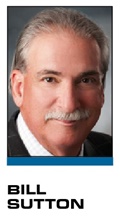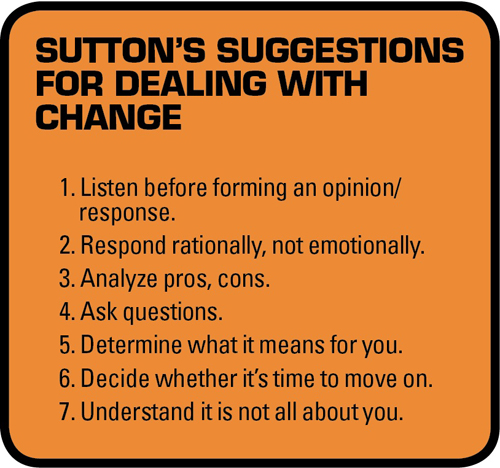No one is irreplaceable.
“The cemetery is full of irreplaceable people.” That is one of my favorite sayings, paraphrased from French statesman Georges Clemenceau. While it may sound cold, and you may not agree, it is true. The replacement might not be as good, but then again it might be better. The one thing you can count on is that it will be different, and the adjustment to different is what we must all master while remaining motivated and productive.
The topic of managing and coping with change was suggested to me through Twitter. A lot of what I share will be based upon my experiences from a managerial perspective as well as being the catalyst causing the change.
On the sports side, a new manager or general manager might result in a new playbook, a new offense and many times new players to implement that offense. The business side is very similar. There are new ways to market and solicit business, new types of meetings, opinions on what went on before, and the possibility that the new leader will bring in some veterans from his or her previous stop. This is the type of change where people can become defensive regarding the old offense and try to avoid the new offense. This is the “different” I described in the previous paragraph.
A new president or chief marketing officer is hired to perform and achieve goals. If the team that is in place immediately shows resistance and does not embrace change, the new leader must look to people he or she knows can execute the new plays and help achieve the goals. This often results in trust hires — proven performers who have a history with the new leader and in whom the new leader trusts.
How can the existing team minimize the influx of new talent? The answer is simple, but the execution is difficult. Embrace change, and agree to never utter the following two harbingers of your own personal doom:
• That’s not the way we do things around here.
• We tried that in the past and it didn’t work.
Unfortunately, those two phrases are heard all too often when there is a change in leadership. A new leader is looking for people who can adapt to change, give the changes time to work and ultimately embrace the new initiatives and direction.
In thinking about this change scenario, which will probably affect each of us at least once in our professional lives (and probably in our personal lives as well), I have constructed Sutton’s Suggestions for dealing effectively with change.
■ Learn to listen and process information before forming an opinion and a response. Too many times we have something to say and are waiting for the person to finish speaking so we can make our point. Listen and think about the new initiatives before reacting.
■ Respond to change as Mr. Spock would — rationally and based upon the facts at hand, not with the raw emotion that is the first instinct. I have a 24/48-hour rule for email responses that have an emotional element. Write the email immediately to express exactly how you feel. Read it again after 24 hours but don’t send it. Read it again after 48 hours to see whether it still reflects how you feel and how passionate you are about the content. If you are still that passionate, then send it. Experience has taught me that in the cases when I did send that email, it differed dramatically from the original copy.
■ Use the Ben Franklin method of analyzing pros and cons about the newly introduced changes. This analysis forces you to see both the positive and the negative in each, and that should help develop your understanding and hopefully your acceptance.
■ Ask questions to make sure that you understand the points that the new leader is trying to convey. Question your peers to see how they have been interpreting the change points, but also meet with the new leader to seek clarification and understanding. You will be respected for doing so.
■ Look within yourself to understand what it is that you really want and how this change will help you in realizing that self-actualizing goal. Change presents opportunity. How you engage that opportunity is up to you, but in most cases there is something that can be learned that will benefit your personal and career development. Also, look within to make sure that there is not anything there that could be causing an adverse reaction to the change.
■ If you can’t salute the general, it might be time to leave the army and find a new one. That’s one of my father’s sayings that has stuck with me a long time and served as the catalyst for several of my career changes. It might not be the general, it might be the fort, or it might be your fellow soldiers, but change often forces us to look at those things we have been accepting and conclude that we are no longer willing to accept them.
■ Understand it is not all about you. While you are important, and how these changes affect you is important, the change is about the organization, the business and the world view in which that business operates. Your perception of that and yourself is influenced greatly by your personal world view.
Remember it is not about the change itself, but how we handle that change and our ability to move forward. The adjustments, refinements and lessons learned from change can help define our individual abilities to be great.
Bill Sutton (wsutton1@usf.edu) is the founding director of the sport and entertainment business management MBA at the University of South Florida, and principal of Bill Sutton & Associates. Follow him on Twitter @Sutton_Impact.





